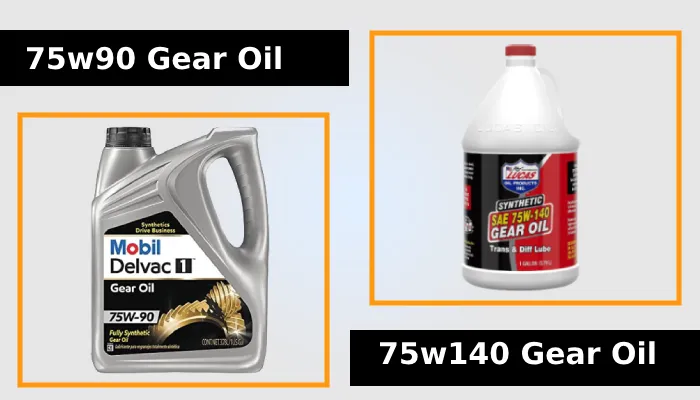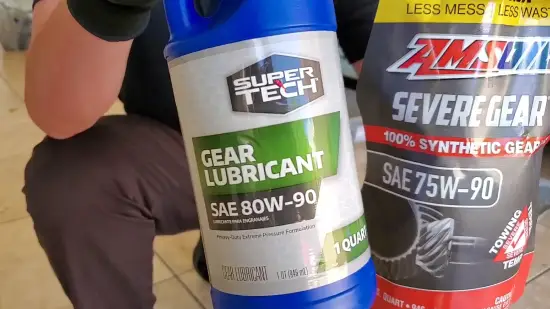Physical Address
304 North Cardinal St.
Dorchester Center, MA 02124
Physical Address
304 North Cardinal St.
Dorchester Center, MA 02124

Gear oil is vital in properly functioning a vehicle’s manual transmission, drive axles, and gears. Two common options for gear oil are 75W-90 and 75W-140. So, choosing the proper gear oil according to your surroundings is crucial for vehicle performance and longevity.
75W-90 gear oil is thinner at higher oil temperatures recommended for colder conditions and provides smoother operation when the weather is cool. Conversely, 75W-140 is thicker at higher temperatures, making it more suitable for hot climates and heavy loads. Also, there are some differences between them.
Through this article, we’ll explore the significant differences between these two gear oils, including their viscosity, performance characteristics, fuel economy, and ideal applications. So keep reading to get better vehicle performance.

When comparing the differences between 75w-90 and 75w-140 gear oil for your vehicle’s transmission box, there are 4 key differences to consider.
The viscosity rating indicates the oil’s resistance to flow at different temperatures. In the case of gear oil, the first number (75) represents its viscosity at lower temperatures, while the second (90 or 140) represents its viscosity at higher temperatures.
75W-90 gear oil is less viscous at higher temperatures than 75W-140 gear oil. This means 75W-90 is better suited for colder conditions, as it flows more easily and provides smoother functioning in cold weather.
Alternatively, 75W-140 gear oil performs better in hot climates and under heavy loads because it thickens at higher temperatures. The higher viscosity of 75W-140 gear oil allows it to maintain its lubricating properties under extreme conditions.
The temperature range of gear oil refers to the range of temperatures at which it can effectively lubricate and protect your transmission.
The 75W-90 gear oil is suitable for a wide temperature range (300°F to 350°F), making it more versatile for various operating conditions. It performs well in cold and hot weather, providing adequate lubrication and protection to your transmission.
Conversely, the 75W-140 gear oil is better suited for common high temperatures (any temperature greater than 280°F) applications. It can handle higher temperatures and provide enhanced protection under extreme operating conditions.
The differences in viscosity have significant implications for performance and application:
75W-90 is known for offering great performance under pressure. This gear oil suits everyday passenger vehicles, particularly in colder and temperate climates. If you drive your car for daily commuting or light-duty use, 75W-90 is a solid choice.
On the other hand, 75W-140 is designed to perform well under more extreme conditions. If you’re operating in extremely hot climates, hauling heavy loads, or driving high-performance vehicles, 75W-140 is the better choice. It can withstand the rigors of these demanding conditions.
The viscosity of gear oils plays a significant role in determining their impact on fuel efficiency.
75W-90 gear oil, being thinner at high temperatures, tends to provide better fuel economy than 75W-140. The thinner viscosity reduces friction and improves lubrication, improving fuel efficiency.
Alternatively, 75W-140 gear oil is less fuel-efficient, with its thicker viscosity at high temperatures. It’s better suited for applications that require enhanced performance and protection rather than prioritizing fuel economy.

When choosing between 75w90 or 75w140 gear oil, there are several factors to consider.
Consider your vehicle’s application when selecting between 75W-90 and 75W-140 transmission oil. The application refers to how you use your vehicle and the demands you place on it.
For daily commuting in a passenger car, 75W-90 is suitable because it offers adequate protection and lubrication.
However, if your vehicle is a truck used for heavy hauling or a high-performance vehicle, 75W-140 is a better choice. These vehicles experience higher loads and generate more heat, requiring gear oil with a higher viscosity to withstand the extra stress.
To choose a perfect gear oil, consider the climate and temperature range you’ll drive. The temperature range is crucial in determining the viscosity of the gear oil you should use.
If you reside in an area with moderate temperatures, 75W-90 gear oil is recommended. It’s formulated to provide smoother operation in cold weather and offers excellent protection against wear and tear.
On the other hand, if you drive in a hot environment, 75W-140 gear oil is more suitable. It’s designed to withstand higher temperatures without thinning out, ensuring optimal lubrication and reducing the risk of damage to the gears.
Choosing the appropriate gear oil for your vehicle’s transmission system involves evaluating the load and stress it will endure.
If your vehicle regularly carries heavy loads, tows trailers, or engages in demanding driving conditions, you must consider the 75W-140 gear oil. This oil is specifically formulated to handle increased stress and wear. It provides improved wear protection and longevity compared to the 75W-90 gear oil.
Also, the higher viscosity of the 75W-140 oil ensures better lubrication and film strength, which is crucial for preventing metal-to-metal contact and reducing friction. This means that even under extreme loads and high temperatures, ensure your transmission system’s smooth operation and longevity.
Consider the fuel economy implications when selecting gear oil.
If fuel efficiency is a priority for you, 75W-90 is the better choice. This is because it has a thinner viscosity at high temperatures, which helps improve fuel economy. The thinner oil flows more easily through the gears, reducing friction and drag and reducing the energy required to turn the gears.
However, the actual impact on fuel economy may vary depending on factors such as the specific vehicle and driving conditions. It’s recommended to consult your vehicle’s manufacturer or a trusted mechanic to determine the best gear oil viscosity for optimal fuel efficiency.
Focusing on the desired smoothness of operation and protection under high-stress conditions, you should prioritize your needs.
If you prioritize smoother operation and reduced clunkiness in shifting, especially in colder temperatures, 75W-90 gear oil is the way to go. Its lower viscosity allows for easier flow and smoother gear changes, promoting a more seamless driving experience.
But if your main concern is maximum protection and longevity, especially in high-stress conditions, 75W-140 gear oil is the better choice. Its higher viscosity provides enhanced film strength and load-carrying capacity, ensuring superior protection against wear and tear.
Also, the thicker oil film formed by 75W-140 gear oil helps to cushion and absorb shock, reducing the risk of damage to gears and other components in high-stress situations.
Cost is an important factor to consider when choosing gear oil, as it can vary depending on the viscosity and additives present in the oil.
Generally, 75W-90 gear oil is more affordable compared to 75W-140 gear oil. This is because 75W-140 gear oil is formulated to withstand higher temperatures and provide better protection, often resulting in a higher price.
However, remember that the cost of gear oil shouldn’t be the sole determining factor. Prioritize your vehicle’s specific needs and choose a gear oil that provides optimal performance and protection, even if it means paying a slightly higher price.

The key distinction between gear oil 90 and 140 lies in their kinematic viscosity. It refers to the oil’s resistance to flow and is measured in millimeters squared per second (mm²/s).
Gear oil 90 has a kinematic viscosity range of 13.5 to 18.4 mm²/s, while gear oil 140 has a higher range of 24.0 to 32.4 mm²/s. This means gear oil 140 has a thicker consistency than gear oil 90.
The higher kinematic viscosity of gear oil 140 allows it to provide better viscosity-temperature behavior and withstand higher loads. It can maintain its lubrication properties under extreme conditions, making it suitable for heavy-duty applications with increased stress and heat generated.
Gear oil 140 is thicker than gear oil 90. The thicker consistency of gear oil 140 provides better lubrication and protection for gears, especially under high loads and extreme operating conditions.
This means that at both cold and hot temperatures, the gear oil with a viscosity of 140 will have a higher flow resistance than the gear oil with a viscosity of 90. Using thicker gear oil can provide enhanced lubrication and protection for your equipment.
A 75W-140 gear oil is specifically formulated for extreme pressures and shock loading to enhance lubrication and protect heavy-duty drivetrains. This type of gear oil is commonly used in heavy-duty vehicles such as trucks, SUVs, and off-road vehicles.
The ’75W’ in the oil’s viscosity rating indicates a low viscosity at low temperatures, allowing for easier cold starts and better lubrication during initial operation. The ‘140’ indicates high viscosity at high temperatures, providing excellent film strength and protection under extreme conditions.
This makes 75W-140 gear oil ideal for heavy-duty applications such as towing, hauling heavy loads, and off-road driving.
Using the wrong gearbox oil can lead to inadequate lubrication, increased friction, and potential damage to your transmission.
Gearbox oil is specifically formulated to provide the necessary lubrication and protection for the gears and other moving parts within the transmission. Using the wrong oil, such as motor oil or brake fluid, can compromise the lubricating properties of the oil, resulting in insufficient lubrication.
This can cause increased friction between the gears, leading to excessive wear and heat generation. Over time, this can damage the transmission components, including gear teeth, bearings, and synchronizers.
Also, using the wrong gearbox oil can affect the viscosity and thermal properties of the oil, further impacting its ability to provide proper lubrication and cooling.
Choosing the right gear oil is a balancing act. You want to provide the necessary protection for your transmission without causing friction or compromising fuel efficiency.
Consider the viscosity and intended use when choosing between gear oil 75w-90 and 75w-140 for your vehicle’s transmission box. While 75w-90 is thinner and suitable for most applications, 75w-140 is thicker and better suited for heavy-duty use and extreme temperatures.
Therefore, consult your vehicle’s manual or seek the advice of a trusted mechanic to determine the most appropriate gear oil for your specific needs. Doing so ensures your transmission operates efficiently, even under demanding conditions, and enjoys a longer lifespan.
Last update on 2026-02-19 / Affiliate links / Images from Amazon Product Advertising API